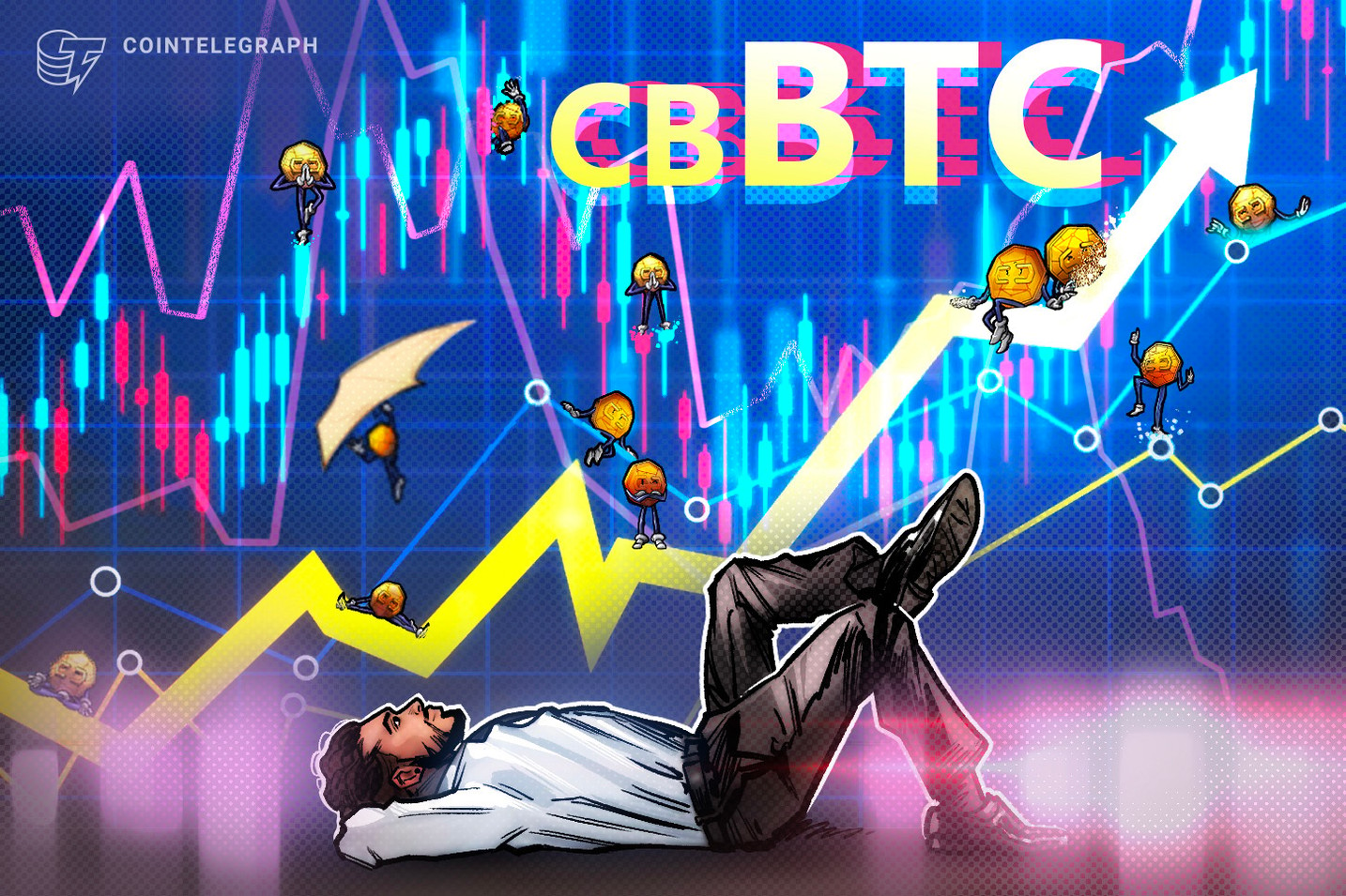Stop panicking about Wrapped Bitcoin — Mint Coinbase’s cbBTC instead

If fear is contagious, then Wrapped Bitcoin’s (WBTC) custodian, BitGo, has started a pandemic.
In August, BitGo’s planned Bitcoin (BTC) custody overhaul sparked panic among WBTC holders. Now, similar fears are enveloping other Bitcoin wrappers.
They are overblown. Your WBTC is still secure and safer alternatives are proliferating. Among newly launched Bitcoin wrappers — tokens representing BTC on other blockchains — Coinbase Wrapped BTC (cbBTC) is the best bet.
Flying too close to (Justin) Sun
On Aug. 9, BitGo tipped plans to grant partial control of WBTC’s Bitcoin backing to BiT Global, a Hong Kong crypto exchange. The partnership wasn’t well received.
BiT Global has ties to Justin Sun, the controversial founder of the TRON smart contract platform. He’s been the subject of multiple misconduct allegations, including November fraud charges from United States regulators. Sun also reportedly tried to misappropriate customer funds from Poloniex, a crypto exchange he bought in 2021.
Decentralized finance (DeFi) protocols have scrambled to cut WBTC exposure. On Sept. 19, Sky — previously Maker — voted to completely remove WBTC from its lending platform.
Now, the contagion is spreading. In September, rumors circulated alleging Coinbase was issuing unbacked Bitcoin IOUs to Blackrock, a crypto exchange-traded fund (ETF) sponsor. That triggered yet another bout of wrapper worries, this time over the safety of Coinbase’s cbBTC.
WBTC is the most popular wrapper token. Source: CoinGecko
Overblown anxieties
The Coinbase rumors are unfounded — and thoroughly debunked — but the concerns about BitGo’s BiT Global partnership are valid. They still don’t justify abandoning WBTC.
Sun clearly has BiT Global under his thumb. He may even own a controlling interest in the company, according to reports. However, Sun doesn’t manage the crypto exchange, and he won’t be directly administering WBTC. Even if he did, misappropriating WBTC’s Bitcoin backing would be virtually impossible.
BitGo stores WBTC’s Bitcoin in a multi-signature wallet, which requires at least two authorized “signers” to approve every BTC transfer. Only one of those signers will be BiT Global. The other two signatures will stay with BitGo’s US and Singapore affiliates, respectively.
Recent: 6 things the US needs to stay competitive in crypto, according to execs
BitGo publishes the addresses of every WBTC custodial wallet. As of Sept. 30, WBTC is backed 1:1 by approximately $10 billion worth of Bitcoin.
The panic is finally subsiding. In September, BitGo pledged to notify WBTC holders 60 days in advance of any custody changes, including adding BiT Global as a signer.
On Sept. 17, Sky halted plans to ditch WBTC after Block Analytica, a risk consultancy, said BitGo’s “additional details and clarity put us in a more comfortable position with the current state of WBTC operations and key management.”
On Sept. 26, WBTC’s total value locked (TVL) on Aave, a DeFi lending protocol, hit record highs of $2 billion, according to Dune Analytics.
Block Analytica comments on WBTC. Source: Sky
Wrapper Wars
The biggest threat to WBTC isn’t Justin Sun. It’s competition from Coinbase’s upstart Bitcoin wrapper, cbBTC.
Launched on Sept. 12, Coinbase’s cbBTC has already topped $250 million in TVL. Initially mintable on Ethereum and Base — Coinbase’s popular layer 2 scaling network — cbBTC will soon launch on Solana, according to a Sept. 20 post on X.
cbBTC’s Bitcoin “shortfall” protections. Source: Coinbase
For anyone concerned about safe Bitcoin custody, Coinbase’s cbBTC is a clear winner. Its reserves are held by Coinbase Custody Trust, a New York chartered virtual currency custodian. That means cbBTC is subject to the most stringent regulatory oversight in crypto.
Stored in dedicated cold-storage wallets, cbBTC’s Bitcoin reserves are segregated from the exchange’s other assets and regularly audited by New York’s Department of Financial Services (NYDFS). They are even insured against cybersecurity risks.
In fact, cbBTC explicitly commits to reimbursing holders for any Bitcoin reserves lost to exploits. It will be adding on-chain proof of reserves soon.
Coinbase’s cbBTC isn’t WBTC’s only challenger. In May, 21.co, the parent company of asset manager 21Shares, launched 21.co Wrapped Bitcoin (21BTC).
On Sept. 23, 21BTC added Chainlink proof-of-reserves, Web3’s gold standard for on-chain reporting. That’s a good sign, but 21BTC still lacks cbBTC’s investor protections and oversight.
Meanwhile, Threshold aims to establish tBTC as a decentralized alternative to custodial Bitcoin wrappers. The DeFi protocol — born from a merger of Keep and NuCypher — delegates tBTC mint-and-burn operations to a distributed network of validators. They are secured by Threshold’s native token, T.
Recent: Elon Musk’s X ban dispute with Brazil takes toll on local crypto community
It’s a work in progress. As of Sept. 30, tBTC is secured by 136 active nodes and some $84 million in staked collateral. At approximately $250 million, tBTC’s market capitalization is already high for Threshold’s modest economic security.
Decentralized Bitcoin wrappers — including those on Bitcoin’s emerging layer 2 networks — might eventually dominate. For now, conventional investor protections are indispensable. That’s where Coinbase’s cbBTC shines.
But, even after the BiT Global setback, it’s still WBTC’s race to lose.
Related News
- Kamala Harris knows crypto voters are up for grabs: New polls confirm
- Binance ‘fully available’ in Argentina after VASP registration
- 3 signs that Bitcoin’s Q3 close was bullish
- Europe gathers global experts to draft ‘Code of Practice’ for AI
- Gemini’s exit from Canada: What’s driving crypto exchanges out?
- Bank of England and FCA launch Digital Securities Sandbox
- European Blockchain Sandbox onboards 41 regulators in second cohort
- Börse Stuttgart, ECB cut settlement time in blockchain test
- Malaysia steps up its AI game with regulations and cloud computing policy
- 'Quantile Regression' Bitcoin price model hints at $275K BTC by November 2025
© 2025 DeFi.io